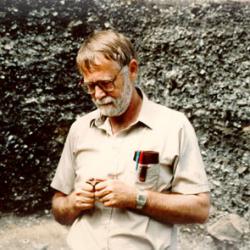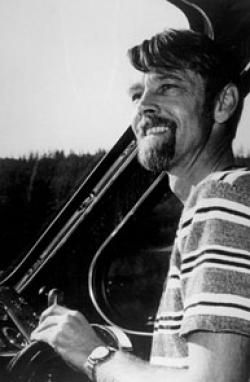

The Smith-Wintemberg Award, named for two pioneers in Canadian archaeology: Harlan I. Smith and William J. Wintemberg, honours members of the Canadian archaeological community who have made an outstanding contribution to the advancement of the archaeological discipline, or to our knowledge of the archaeological past in Canada.
In recognition of Roy L. Carlson's contributions to both of these areas, the Canadian Archaeological Association presented the Smith-Wintemberg Award to him on May 6, 1995, at the annual meeting in Kelowna, British Columbia.
Roy Carlson's involvement in archaeology began in 1950 as a participant in excavations on the San Juan Islands, and as a student at the University of Washington where he earned BA (1952) and MA (1955) degrees. He received a Ph.D. from the University of Arizona in 1961. Roy Carlson's early career focused on the Pacific Northwest, American Southwest and Northeast Africa. In 1966, he received a faculty appointment at Simon Fraser University and shifted his research focus to coastal British Columbia, an emphasis that continues to the present.
In 1969, Carlson began the drive to establish the Department of Archaeology which was founded in 1971, and in the same year was appointed Professor of Archaeology. In August, 1995, Roy Carlson retired from the faculty at Simon Fraser University. During his 45 year career, Roy has distinguished himself in scholarship, teaching and administration.
Roy Carlson's publication record began in 1954 with an article in American Anthropologist on the Plateau vision quest. Since then, he has produced a continuous stream of scholarly publications, including three monographs, five edited volumes, over 60 articles and 16 book reviews. These publications have appeared in Canadian Journal of Archaeology, American Antiquity, Current Anthropology, Southwestern Journal of Anthropology, Science, the Africanist Journal Kush, B.C. Studies, Journal of Paleopathology, American Indian Art, Medical Anthropology Quarterly, American Archaeologist as well as in numerous books, conference proceedings, encyclopedias and university research papers. Approximately two thirds of these publications focus on coastal British Columbia from its earliest occupations to the historic period.
Carlson's position as a Canadian expert on the Northwest Coast has been frequently called upon through requested participation at international forums, in invitations to contribute chapters to the Northwest Coast Volume of the Handbook of North American Indians and the Canadian Historical Atlas, and in articles, books, and research grant proposals sent to him for review. Roy Carlson's position as a Canadian academic has been recognized in his participation as member and chair on SSHRC adjudication committees, in his role as Canadian representative to the Intemational Congress of Anthropological and Ethnological Sciences, and as a Canada/USSR exchange scholar in the Soviet Academy of Sciences. Most recently, he served as lecturer at Jilin University in the Peoples Republic of China.
With respect to Canadian archaeology in general, Roy Carlson's greatest contribution has been his role in the creation, development and administration of the Department of Archaeology at Simon Fraser University. In response to a proposal authored by Carlson and Philip Hobler, the department was founded in 1971. Elected as Chair, a position he would hold for 13 of the next 23 years, Roy committed himself to the development and growth of the Department. The Department is now one of the two largest archaeology programs in Canada largely as a result of Carlson's effort and administrative abilities. For seven of the years in which Carlson was not Department Chair, he continued to serve and promote its interests by his election to the University Senate. The Department of Archaeology at Simon Fraser owes its origins, development and much of its current status to Roy Carlson's foresight and energies.
Over his 28 years as a professor at Simon Fraser University, Roy Carlson has taught thousands of students. His dominant approach as a teacher has been one of active participation, whether through field trips to archaeological sites or analysis of archaeological materials as a class project. A revealing example of this recently occurred when, invited to a potlatch at Bella Coola on the central coast of British Columbia, he received permission and took his entire Northwest Coast archaeology class, a task requiring a considerable investment of time, energy and enthusiasm rewarded only by the gratitude of his students.
Carlson's greatest strength as a teacher is in graduate supervision. To the present, he has been senior supervisor for 20 successful MA students and another 9 PhD's, in addition to participation as a second supervisor on an equal if not greater number of committees. Many members of the Canadian archaeological community, whether academic or in an applied field, have been in some way involved with Carlson as a mentor. Roy Carlson's success as a senior supervisor is evident by the fact that, of the students he has been a principal sponsor for, only two have failed to complete their degree requirements.
As a teacher, Roy Carlson has made a consistent commitment to promote archaeology and its results in the public and avocational arena. He has given countless radio, television and newspaper interviews, and was the central figure in a program on British Columbia archaeology for CTV's University of the Air program. Roy Carlson has been involved in the development of a grade school teachers manual and support materials for level four instruction on early Native cultures of North America. He has also written popular articles for publication, and has been a strong supporter of an informed and responsible avocational archaeological community. The Archaeological Society of British Columbia was formed in the late 1960s as a direct result of a series of Carlson's lectures on the archaeology of British Columbia, for which the Society later awarded him an Honorary Life Membership.
It is difficult to gauge the full impact of an individual's career in this brief statement. Nevertheless, as an administrator, scholar and teacher, Roy Carlson has played a prominent role in the development of archaeology in western Canada over the past quarter century. As an individual integral to the founding and development of the Archaeology Department at Simon Fraser University, in the training of undergraduate and graduate students and in scholarly research into North West Coast archaeology, Roy Carlson's work has been exemplary and merits recognition by presenting him with the Smith-Wintemberg Award.
ACKNOWLEDGEMENTS David Burley and Jon Driver provided information on the career of Roy Carlson.
David Pokotylo
Department of Anthropology and Sociology
University of British Columbia
6303 N. W. Marine Drive
Vancouver, B.C. V6T 1Z1
the first photograph of Roy Carlson was taken in 1986 at Pender Canal and the second at the helm of Sisiutl in 1973.
previously published in the Canadian Journal of Archaeology, vol.20:5-6.
